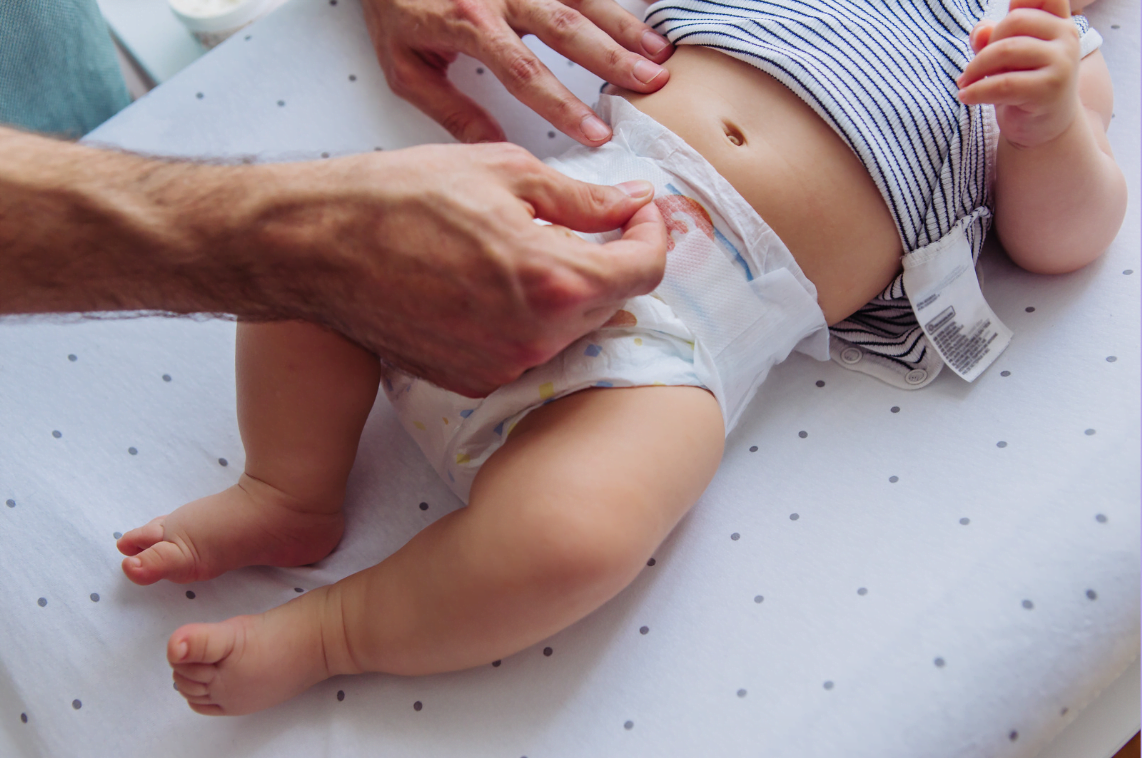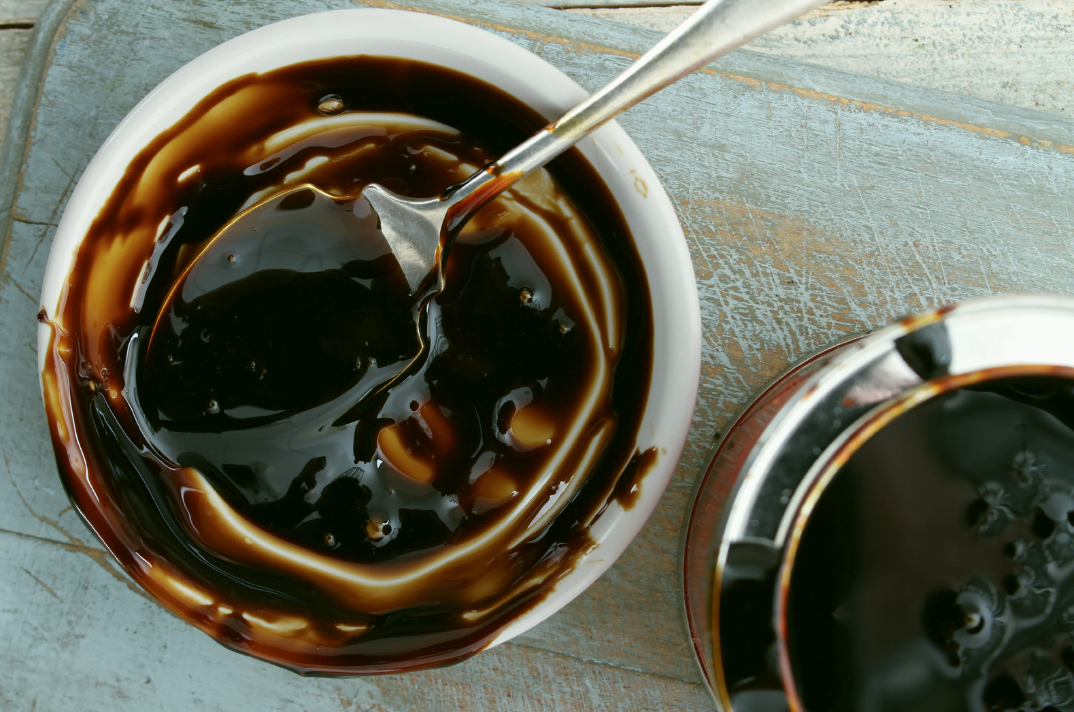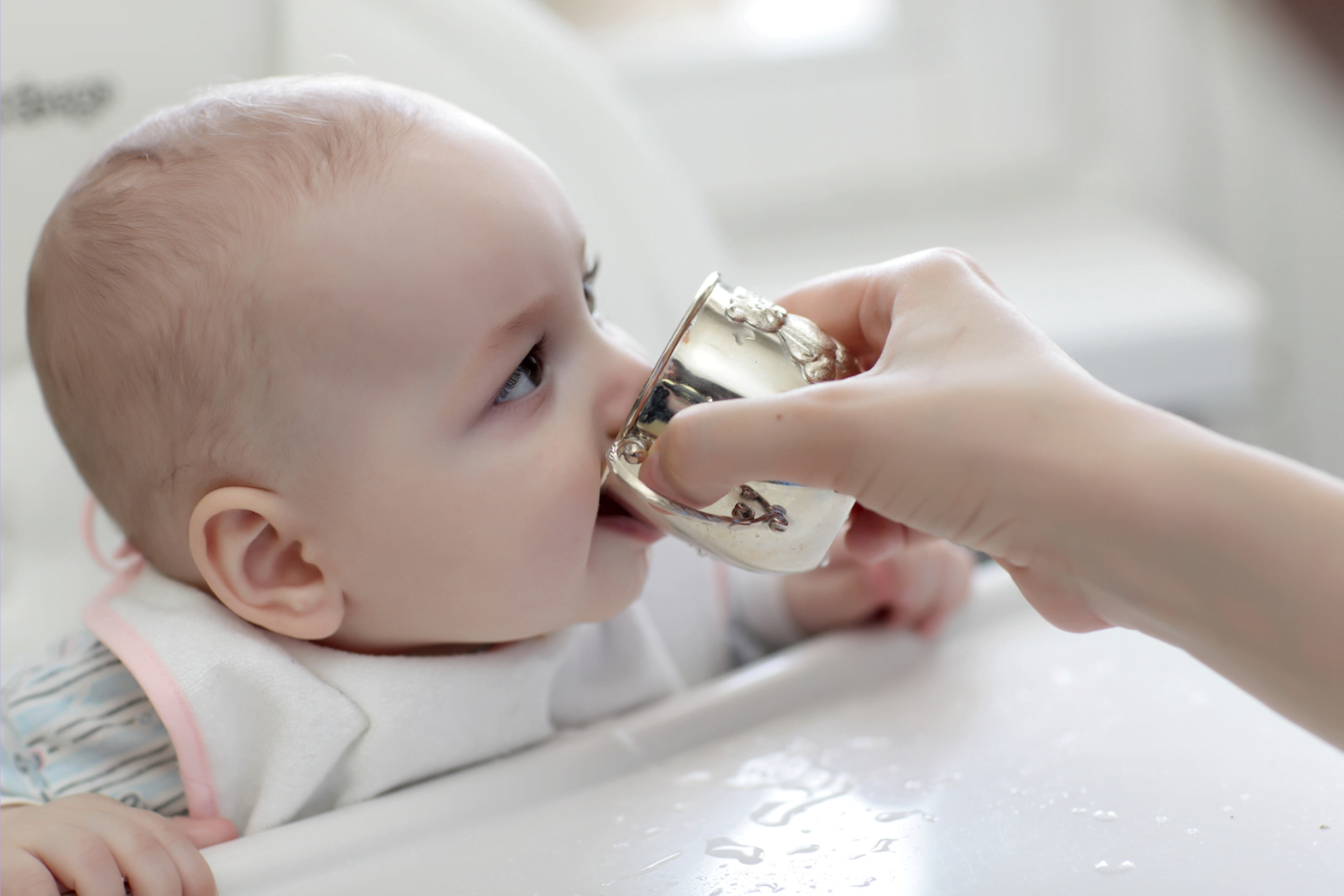How to diagnose and treat constipation in babies

Are your wondering "is my baby's bowel movement normal?" as a new parent? Newborn babies can have a lot of variability in their poo and baby constipation is fairly common.
In this article we get help from The Pediatrician Mom, Krupa Playforth MD to learn all about your baby's poo! We'll help you understand the factors that can make make a baby constipated, identify the signs of constipation, and what you can do to help them with simple natural remedies and other treatments.
What are normal baby bowel movements?

What Should Normal Baby Poo Look Like?
When you're checking your baby's nappy, what you see can tell you a lot about your baby's tummy health. Baby poop can vary quite a lot. Here's what to expect with normal baby's bowel movements at different ages.
Normal newborn poo

Normal newborn poo looks like black treacle
Right after birth, babies have a type of poop called meconium. It's sticky, really dark (almost black), and looks a bit like tar. Meconium is made of the amniotic fluid and other substances that the babies eat while in the womb! Meconium stools usually clear after the first 2-3 days after birth.
Normal stool in the first 6 months

Normal baby poop looks like yellow curry paste
If your baby is breastfed, their poop will usually be soft, even a bit runny, and that's totally normal. Breastfed baby poop is usually a yellowish, mustard colour and might have tiny, seed-like bits.
Breastfed babies often poop quite a bit, sometimes even after every feeding in the beginning.
Normal stool with formula milk
For formula-fed babies, their poop tends to be a bit thicker, kind of like paste, and can range from yellow to brown. These babies might not poop as often as breastfed ones, and the poop can be a bit smellier.
But, if your baby’s poop is hard and looks like little pellets, that could be a sign of constipation. If they seem to have a hard time going, or if their poop is always hard, it's a good idea to chat with your doctor.
Normal poo during weaning
As your baby starts eating solid foods, you'll notice their poop changes again. It'll get firmer and the colour will vary depending on what they eat. That's totally normal and just part of them growing up.
As toddlers settle into eating solid food they will naturally begin pooing fewer times per day. This does not indicate constipation but is instead a usual pattern as their bowels become more mature.
How often should my baby poo?

Babies can poop anyway between once and ten times per day. Most babies will have a 'normal' routine for them and you'll get to know it (intimately.)
If you notice the frequency change that can be an indicator that something is wrong. It's common for this frequency to change when a little one is ill, for example with a cough, cold or ear infection. The frequency can go up or down, and may indicate that your little one is struggling. If you are worried you should get medical advice.
Recognising Constipation in Babies

Symptoms of constipation
There are few key signs and symptoms of constipation in babies and children. The key signs to look out for include
Reduced frequency of bowel movements. This can vary from baby to baby, the main thing is a change that's not usual for them.
Hard poo that looks like pellets.
Discomfort when a baby is trying to pass during defecation. It's normal for babies to make lots of funny noises and faces when passing stool. But this should not last more than a few minutes before the poop arrives, and usually isn't usually painful.
Other signs of constipation
Full stomach. Babies typically do have round bellies, but an increasingly large stomach can baby's constipation.
Reduced appetite. Babies and toddlers do very in their appetites - but if your babies diet changes this can be on of the effects as well as causes of constipation.
How to treat constipation in babies
Ensure your baby is getting enough fluids
If your little one is 6 months or under you should first check they are taking enough formula or breast milk. Check with your doctor or midwife if you are not sure about how much that should be.
For babies who have started on solid foods, you can add cooled boiled water. Fruit juices and other drinks should be diluted as much as possible to ensure that there is enough water to effectively make your baby's poo soft enough to pass.
How to add fibre to a child's diet
Incorporating fibre-rich foods and certain fruits can make a significant difference. But it can be tricky to include fibre for picky eaters. Remember whole fruits, beans, lentils are all good sources of fibre as well as vegetables.
What medications are the for constipation in babies?
When it comes to treating constipation in babies, it's essential to consult with a pediatrician or healthcare provider first. They can offer personalized advice and recommend specific medications if necessary. However, here's a general overview of some common types of medications used for treating constipation in babies:
Laxatives
These are often the first line of treatment for relieving constipation. Pediatric laxatives work by softening the stool or stimulating bowel movements. Examples include lactulose and polyethylene glycol (PEG). It's important to use these under medical supervision, especially in young infants, as the dosage and type of laxative will depend on the baby's age and health status.
Stool Softeners
These medications work by increasing the amount of water in the stool, making it softer and easier to pass. Sociumd docusate is a commonly used stool softener for children.
Suppositories
These are used for immediate relief of constipation and work by stimulating the rectum. Suppositories contain glycerin are generally considered safe for infants, but should only be used under medical guidance.
Can I relieve constipation with home remedies?

Can I give cooled boiled water to my baby?
Cooled boiled water is often recommended as a remedy for constipation in babies, particularly those who are not exclusively breastfed and are older than 6 months.
Cooled boiled water hydrates the baby’s body, subsequently softening the stools and making them easier to pass. The process of boiling water ensures that all impurities are removed, making it safe for young babies to consume.
The volume of water to offer, however, varies significantly with the age of the baby. It’s generally advised not to give water to very young babies under 6 months. Their digestive systems are designed for exclusive breastfeeding or formula feeding, and additional water can disrupt their nutrient intake. If cooled boiled water is being given it should be in very small volumes of 5-10 mL.
Once a baby is over 6 months old and has started on solid foods, introducing small amounts of water is advisable. A recommended amount is 2 to 4 ounces (60 to 120 mL) of water per day, offered in small sips spread throughout the day. This should be in addition to their regular breast milk or formula.
As the baby grows into a toddler and their diet expands to include a variety of solid foods, their water intake can be increased. Typically, a toddler can be offered between 1 to 4 cups (240 to 960 milliliters) of water daily, depending on their size, diet, and activity levels.
Can massage effectively treat constipation?
Massage therapy is as an effective method for treating constipation, particularly in newborns and infants. The gentle, rhythmic motions of a tummy massage can do wonders for the little one's digestive system.
It works by activating the muscles in the digestive tract, aiding in the movement of stool through the intestines. This is particularly beneficial for newborns whose digestive systems are still developing and respond well to such physical stimulation.
Use gentle circular motions on the belly, mimicking the movement of the intestines, and moving the legs in a bicycling motion to stimulate the lower abdominal region. Additionally, careful massaging of the lower back can also be beneficial.
While massage therapy is indeed beneficial, it's most effective when paired with other treatments like dietary changes. Ensuring adequate hydration and a diet rich in fiber are critical components in preventing and treating constipation.
Does constipation in babies mean they have a medical problem?

Constipation in babies is a common and treatable issue, but in rare cases, it might be indicative of underlying medical conditions. The must common underlying problem is mild dehydration - babies and toddlers not drinking enough fluids, especially during weaning onto solid foods.
Rarely severe constipation can indicate a more serious medical conditions such as cystic fibrosis, Hirschsprung's disease, or a bowel obstruction. These conditions are rare and cause babies and toddlers to be very unwell. If you are worried about your baby you should get urgent advice from a medical profession (such as your national health service GP in the UK.)
Take Homes
Understanding the signs, causes, and remedies for constipation in babies is crucial for effective management. Each baby is unique, and what works for one might not be suitable for another.
Home remedies like cooled boiled water, dietary changes, and gentle massages can be beneficial, but it's important to consult healthcare professionals in cases of persistent issues or when introducing new elements to a baby's diet.
Keeping a close eye on your baby's bowel movements and seeking advice when necessary will ensure your baby's digestive health is well taken care of.
We hope you find this article useful. Here are some other helpful links for reliable sources of advice about constipation in babies.
NHS Start for Life provides comprehensive information on the symptoms, causes, and home treatment of constipation in babies, especially those who are breastfed.Explore more at NHS - Start for Life.
The Breastfeeding Network offers a factsheet on constipation treatment in breastfeeding mothers, providing guidelines and suggestions for managing this common issue.
UNICEF provides a variety of evidence-based resources for parents on infant feeding and overcoming common breastfeeding challenges, along with information on mother support groups.
British Nutrition Foundation is a charity offering information on how to feed a newborn baby, including tips on healthy eating for breastfeeding mothers and foods or drinks to avoid.

